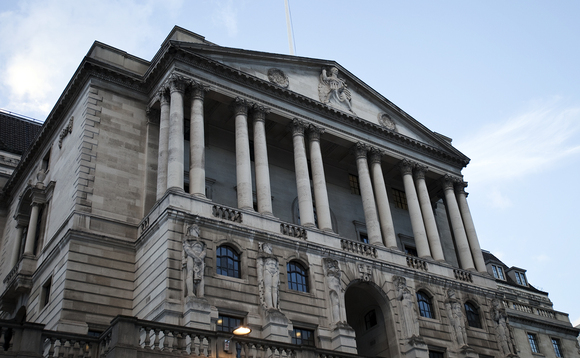MPC referenced 'large and volatile moves in global financial markets'

The Bank of England raised interest rates by 25bps.
The Bank of England (BoE) has hiked interest rates by 25 basis points, as the turmoil in the banking sector clashes with the central bank's desire to bring down inflation.
In a seven/two split, the central bank chose to increase interest rates to 4.25%, with two members voting to maintain rates at 4%.
The bank's Monetary Policy Committee (MPC) referenced the "large and volatile moves in global financial markets" in its report, and said that its Financial Policy Committee had judged that the UK banking system "remains resilient" due to its "robust capital and strong liquidity positions".
It added that it was now forecasting that GDP growth predictions have moved to be slightly positive in the second quarter of this year, from an expectation of a 0.4% decrease as predicted in the last MPC meeting.
Following the collapse of US regional banks such as Silicon Valley Bank and turmoil around Credit Suisse, markets began pricing even odds that there would be no hike from the bank, in an attempt to maintain market stability.
However, after data was published that revealed inflation in February had not fallen into single digits but instead risen to 10.4%, futures markets shifted sharply, eventually predicting a 99% chance that the central bank would make a hike.
The MPC said in their report today: "CPI inflation increased unexpectedly in the latest release, but it remains likely to fall sharply over the rest of the year."
The news follows a similar decision from the Federal Reserve yesterday (22 March), where the US central bank chose to hike rates by 25bp to balance still-high inflation and strains within the banking sector.
Abrdn Adviser strategic director Jonny Black said: "Following yesterday's inflation announcement, advisers and clients will have been eager to see what direction the Bank of England would go with interest rates.
"And while the chancellor painted a rosy picture on future inflation rates, today's rise shows that the bank still believes some form of action is necessary to slow price rises down.
"Today's base rate rise could prompt fresh conversations around investment strategies. Advisers will need to ensure that clients still have the best chance of making their money work towards their long-term strategies, and to adjust course if necessary."
AJ Bell head of personal finance Laura Suter commented: "This has to be the first interest rate hike that can be linked to a salad shortage. Before yesterday's inflation figures release it was 50:50 whether the bank was going to hike rates or keep them at 4%, but once that leap in inflation was published it looked nailed-on that another interest rate hike was coming our way. Just two members of the MPC voted against the increase, instead thinking rates should stay at 4%.
"The increase to 4.25% marks another 14-year high - the last time rates were higher was October 2008. It also marks the 11th consecutive interest rate hike since the current rate hike cycle began in December 2021.
"The bank has two competing devils on its shoulders that it wants to respond to: the ongoing crisis in the banking industry putting the jitters in markets and the worry that inflation isn't dropping back as fast as it had hoped. Today inflation won."
Quilter financial planning expert Rio Stedford said: "For savers, this increase may lead to better returns on savings accounts, as banks and financial institutions adjust their interest rates in line with the BoE base rate. However, it's essential to shop around for the best rates as not all banks increase their rates as quickly as others. It's also worth considering other savings vehicles such as fixed-term deposits, bonds, or even diversified investments to maximise returns."
He added: "The rise in interest rates can have a positive effect on annuity rates, which are closely linked to government bond yields. Higher interest rates generally lead to higher bond yields, which in turn lead to better annuity rates. This means that retirees who are about to purchase an annuity could receive a higher income throughout their retirement. Individuals nearing retirement should closely monitor interest rates and bond yields and consult with a financial adviser to determine the best course of action when considering purchasing an annuity."
Standard Life managing director for customer Dean Butler added the rise in rates "while potentially good news for people whose savings outweigh their borrowing, adds further pressure to the significant minority of retirees who still have a mortgage to pay".
"Only a year ago we were in a completely different environment - it's difficult to believe that the rate was still below 1% until last May. The speed and severity of the change has taken everyone by surprise, and retirees who were living quite comfortably in the spring of 2022 might now find themselves struggling, particularly as rate rises have been coupled with double-digit inflation," he concluded.






No comments :
Post a Comment